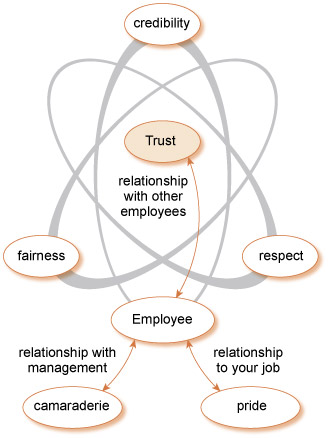4 The challenge of trust in organisations
There is no doubt that trust is an appealing concept and one that is highly valued. In our daily lives it is an important feature of our relationships and social adjustment. But in the context of organisational life, trust does not necessarily sit easily.
As mentioned in the introductory section, the nature of work has undergone significant changes, leading to a need to reconsider old command and control modes of management. Contemporary organisations are increasingly placing a greater emphasis on voluntary forms of cooperation such as employee engagement. Underpinning the heightened need for cooperation and engagement, however, is the fundamental issue of trust.
The main changes that have led to the focus on developing trust within organisations are highlighted below:
- Changed work organisation – people are increasingly working in widely dispersed groups and in flexible working arrangements, including homeworking, remote working, virtual working, and working different types of work schedules. This spatial and temporal dispersion of work renders traditional control and monitoring unviable and implies the need for a new type of both interdependence and cooperation between workers and managers.
- Diversity – people are also working within a diverse workforce across different geographical locations both nationally and internationally. As with the point above, a dispersed workforce requires a new type of interdependence and cooperation between workers and managers. Moreover, the increased diversity within the workforce leads to the need for people to be able and willing to trust people with very different backgrounds.
- The design and content of work – rather than routinised and simple tasks, jobs are increasingly focused around a strong customer service orientation, as well as ‘knowledge work’ and intellectual labour. Each of these types of work depends heavily on high levels of engagement and voluntary cooperation in work, again leading to a focus on cooperation and trust.
- Structural change within organisations – hierarchies within organisations are increasingly being replaced by lateral alliances and social relations (Sheppard and Tuchinsky, 1996). Flatter hierarchical structures mean that people are working in teams, with responsibilities shared across group members, and within matrix structures with different managers for different tasks. Against this backdrop, formal controls and sanctions are minimal and relationships between co-workers and management can be complex; trust becomes paramount.
In the next activity you will explore some of the work that has taken place to study trust and effectiveness within one structural component of organisations: teams.
Activity 5: ‘Work team trust and effectiveness’
Think about your own work team(s) or one in which you have worked. Reflect on your experience of working in the team(s) and the level of trust with the team(s). Do you think the level of trust has affected the effectiveness of the team, its performance or the commitment to the organisation? Record your thoughts below.

